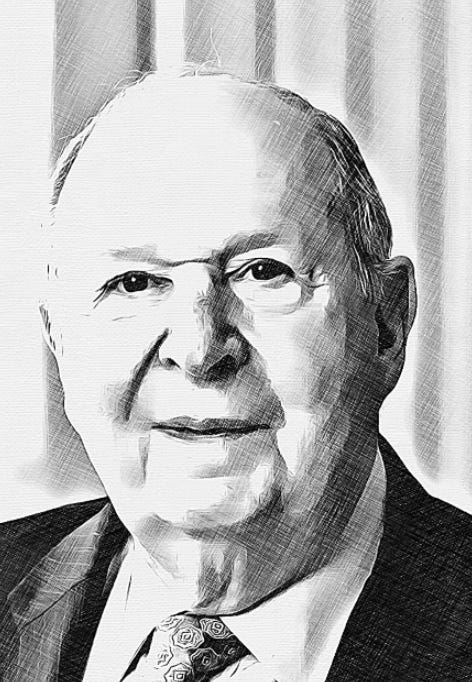We all know Warren Buffett and how good an investor he has proven to be over his lifetime. We also know about how instrumental Charlie Munger has been in the success of Warren Buffett. But very few are familiar with the third Musketeer in the success of Berkshire Hathaway, Lou Simpson.
GEICO was born in 1936 as an auto-insurance company that initially targeted federal employees and certain categories of enlisted military officers.
In 1948, the legendary investor Benjamin Graham took a stake in Geico. Graham was a professor at Columbia University in New York and Warren Buffett was one of his students.
The link between GEICO and Warren Buffett was thereby established, and in 1951 Buffett made his first official appearance in GEICO's history with an initial investment. Buffett increased his investment in 1976 and eventually bought the company outright in 1995.
Buffett played a role in steering the business as it grew over the years and branched out into other forms of insurance.
In August 1979, Geico sought a new investment manager and Buffett played a key part in the selection process.
“Stop the Search. That’s the fellow.”
Warren Buffett immediately on having interviewed Lou Simpson
Over the next three decades, Lou was responsible for managing the auto insurers’ investments, which grew to $5 billion by his retirement in 2010.
There is no doubt that Simpson was a great investor and Buffet knew he had what it took from the outset. It takes one to know one!
“Simply put, Lou is one of the investment greats.”
Warren Buffett, 2010 Shareholder Letter
The chart above shows that an investment of $1,000 in 1979 was worth over $100,000 by 2004 (over 100x growth), when it would have grown to $23,700 if it had been invested in the S&P 500. Simpson achieved compounded returns of 20.3% for 25 years as the manager of GEICO’s equities.
Achieving 20.3% in a single year is an achievement, but consistently doing so for quarter of a century is astounding. It is worthy of note that Simpson continued to outperform the S&P500 until his retirement in 2010.
Buffet greatly admired Simpson and even considered him as his successor at Berkshire Hathaway. In his 2006 shareholder letter Buffett wrote:
“At one time, Charlie was my potential replacement for investing, and more recently Lou Simpson has filled that slot. Lou is a top-notch investor with an outstanding long-term record... But he is only six years younger. If I were to die soon, he would fill in magnificently for a short period. For the long-term, though, we need a different answer.”
Warren Buffett, 2006 Shareholder Letter
This proved prescient because Buffett outlived Simpson who sadly passed away in January 2022.
The Secret of Lou Simpson’s Success
“My approach is eclectic. I try to read all company documents carefully. We try to talk to competitors. We try to find people more knowledgeable about the business than we are. We do not rely on Wall Street-generated research. We do our own research. We try to meet with top management… What we do is run a long-time-horizon portfolio comprised of ten to fifteen stocks. Most of them are U.S.-based, and they all have similar characteristics. Basically, they’re good businesses. They have a high return on capital, consistently good returns, and they’re run by leaders who want to create long-term value for shareholders while also treating their stakeholders right.”
Lou Simpson
The last part of this quote is worth repeating, particularly in today’s culture where the management of many companies feel that they have the right to enrich themselves at the expense of shareholders by way of SBC. (This ought to stand for ‘significant bleed on capital’ in my opinion, to learn more click link: stock based compensation abuse ).
“One of the things I’ve learned over the years is how important management is in building or subtracting from value. We will try to see a senior person and prefer to visit a company at their office, almost like kicking the tires. You can have all the written information in the world, but I think it is important to figure out how senior people in a company think.”
Lou Simpson
In GEICO’s 1986 annual report, Lou outlined his investment approach:
Think independently
Invest in high-quality businesses run for the shareholders
Pay only a reasonable price, even for an excellent business
Invest for the long-term
Do not diversify excessively
On point five, Lou and Buffett have a very similar approach.
“Good investment ideas - that is, companies that meet our criteria - are difficult to find. When we think we have found one, we make a large commitment. The five largest holdings at Geico account for more than 50% of the stock portfolio.”
Lou Simpson
Lou often mentioned Buffett’s 20-hole punch card idea in which Buffett suggests that one invests with a sniper rifle rather than a scatter gun. Look hard for a good idea and if you have conviction, go all in. Don’t waste time firing randomly in the hope that you may get lucky. Invest as though you have a punch card, each hole punched represents an investment and you are only permitted 20 holes in a life time. That alters one’s mindset considerably.
“He gets one or two really strong ideas a year and then likes to swing very hard.”
Warren Buffett, 2004 Shareholder letter, referring to Simpson
There are great lessons to be learned here for all of us.






